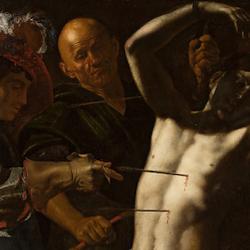Patrick Clark’s Perfection in Death is a study of Thomas’s treatment of the virtue of courage, especially as expressed in martyrdom, against the background of ancient treatments of the same subject – from Homer to Socrates to Aristotle. He poses the dilemma on the first page: “If acts of virtue are, as Aristotle says, the sorts of acts that render an agent good in terms of the goodness befitting an agent’s particular nature, and if the sort of goodness befitting an agent’s particular nature is revealed by the agent’s characteristic inclinations, then how is it that a fully voluntary act of ultimate self-sacrifice could qualify as an act of virtue when accomplishing that act would mean contravening the deepest of all inclinations, namely the desire to preserve one’s self in existence?” (xiii).
At the center of Clark’s ultimate answer to this dilemma is his emphasis on the Christological core of Thomas’s ethics. Among other things, it’s the example of Jesus that displaces self-sacrifice from its ancient/Aristotelian context in war to the context of martyrdom.
Along the way to this conclusion, Clark addresses the still-controversial question of the relation of the natural and supernatural in Thomas. Thomas offers the martyr as the “paradigmatic specification of courage,” but how can the martyr exemplify courage in both its natural and supernatural dimensions? “In what sense does the act of martyrdom actually preserve the natural human good? Does it not, by definition, entail the loss of this good?” And if that’s the case, then what becomes of “grace does not destroy but preserves nature”? (209).
An obvious solution is to detach the natural and supernatural and take “Aquinas’s account of martyrdom as an instance in which he reveals his preference for the supernatural good to the exclusion of the natural” (209). Clark does not think that “an exclusive separation of natural and supernatural perfect” takes account of “Aquinas’s larger metaphysical and anthropological commitments” (210).
But that merely brings the question back. One part of his answer is that Christ’s saving grace and example “reflects a new emphasis on the interior dimensions of courage, an emphasis that extends the scope of the necessity and practicability of courage to all rational agents – and not just male soldiers.” Thomas does this by emphasizing the need for courage in a “world of chance and misfortune” (211). That is only a partial answer, though, since it does not give sufficient attention to courageous action.
The more fundamental solution, Clark claims, is to recognize that the ultimate good is not the good only of the individual agent but the good of the whole cosmos: “Martyrdom is the highest act of courage because it preserves the supreme mode of human activity. It defends the highest actualization of our natural potencies, which for Aquinas involves not only the perfection of our individual nature, but the perfection of the universe as a whole.” These two perfections are united by reason, and for Aquinas “the perfect of our nature necessarily involves growth in divine similitude not merely through our understanding of the world but through our understanding of its divine origin as well” (215).
And this is related to the Christological center of Thomas’s ethics: “the incarnation introduces into the natural order an entirely new and inconceivably transformative reality. At the same time, though, the union that this new grace establishes between God and the human person is something that ‘fits’ the sort of perfection belonging to the person according to its nature.” The radical newness that the incarnation enables doesn’t “in any way contradict our nature or our natural perfection.” The new creature in Christ is “truly new without at the same time nullifying the natural dynamisms that belong to the human person” (226).














